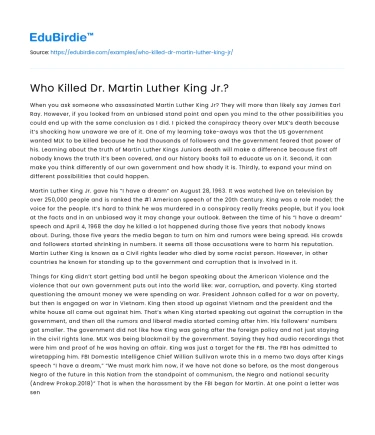Introduction
The assassination of Dr. Martin Luther King Jr. on April 4, 1968, remains one of the most contentious and extensively analyzed events in American history. While James Earl Ray was convicted for the murder, questions about the true circumstances and potential conspiracies continue to provoke debate among scholars, historians, and the public. This essay seeks to explore the complex narrative surrounding King's assassination, analyzing the evidence against Ray, examining potential conspiracies, and considering alternate theories that challenge the official account. By critically evaluating these aspects, this essay aims to provide a comprehensive understanding of the varied perspectives on who might have been responsible for the death of one of America’s most influential civil rights leaders.
The Official Account: James Earl Ray's Conviction
The conviction of James Earl Ray stands as the official resolution to the assassination of Dr. Martin Luther King Jr. Ray, a career criminal, was arrested in London two months after the assassination and subsequently extradited to the United States. In 1969, Ray entered a guilty plea to avoid the death penalty, receiving a 99-year prison sentence instead. The prosecution presented evidence such as Ray's fingerprints on the murder weapon and his presence in Memphis, where King was assassinated at the Lorraine Motel. Furthermore, Ray's own admission of guilt, despite later retractions, bolstered the prosecution's case against him (Branch, 1988).
Save your time!
We can take care of your essay
- Proper editing and formatting
- Free revision, title page, and bibliography
- Flexible prices and money-back guarantee
However, Ray's later claims of innocence and his assertion that he was a mere pawn in a larger conspiracy have fueled ongoing skepticism. Ray recanted his confession shortly after his conviction, stating that he had been coerced into pleading guilty by his attorney, who promised him a more favorable deal. This narrative of coercion and manipulation has led some to question the integrity of the judicial proceedings that led to Ray's conviction. Critics argue that the evidence against Ray was circumstantial and inadequate to establish his guilt beyond a reasonable doubt, suggesting that the case may have been rushed to provide the nation with a semblance of closure (Posner, 1998).
Transitioning from the examination of Ray's conviction, it is crucial to delve into the numerous theories that suggest a broader conspiracy at work. These theories propose that various entities, ranging from government agencies to organized crime, may have orchestrated King's assassination to stifle his burgeoning influence during a period of significant social upheaval.
Conspiracy Theories and Alternate Perspectives
The notion of a conspiracy involving Dr. King's assassination has persisted for decades, supported by various allegations and speculative narratives. One prominent theory implicates government agencies, such as the FBI and CIA, in orchestrating the murder. During King's lifetime, the FBI, under J. Edgar Hoover's leadership, conducted extensive surveillance on him, viewing his civil rights activism with suspicion and labeling him a potential threat to national security. This historical context has fueled speculation that elements within the government sought to eliminate King to prevent further civil unrest (Garrow, 1986).
Additionally, a civil trial in 1999 brought by the King family against Loyd Jowers, a Memphis bar owner, concluded with a jury finding that King was the victim of a conspiracy involving "governmental agencies." Although the trial did not have the binding authority of a criminal court, it reignited interest in the conspiracy theories, lending them renewed credibility in the eyes of some observers. However, critics of the conspiracy theories argue that the evidence presented in such trials is often anecdotal and lacks the substantive proof required for widespread acceptance (Kelin, 2002).
As we transition to further exploration of alternate theories, it is important to consider the motivations and potential involvement of other groups or individuals who might have had a vested interest in silencing Dr. King.
Motivations and Involvement of Other Entities
Beyond governmental conspiracy theories, some scholars and analysts have suggested that organized crime or extremist groups may have been complicit in King's assassination. During the 1960s, the civil rights movement faced significant opposition from entities vehemently opposed to racial integration and equality. These groups, driven by ideological fervor, might have perceived King as a direct threat to their sociopolitical agendas, providing them with a motive to orchestrate his assassination (Dyson, 2000).
Moreover, the economic repercussions of King's activism on businesses that relied on segregationist policies could have spurred corporate interests to support or even initiate a plot against him. The economic disruptions caused by King's advocacy for labor rights and economic justice posed a significant challenge to the status quo, potentially aligning financial interests against him. However, these theories often lack concrete evidence, relying on circumstantial connections and speculative motivations rather than definitive proof of involvement.
As the essay transitions towards a conclusion, it is imperative to synthesize the discussions surrounding the various theories and consider their implications for understanding the complexities of Dr. King's assassination.
Conclusion
The assassination of Dr. Martin Luther King Jr. remains shrouded in mystery and speculation, with the official conviction of James Earl Ray being continually challenged by alternate theories. While Ray's conviction provides a straightforward narrative, the persistent doubts and conspiracy theories highlight the complexities surrounding the case. The potential involvement of government agencies, organized crime, and extremist groups illustrates the multifaceted nature of the assassination, reflecting broader societal tensions of the era.
Ultimately, the enduring debate over who killed Dr. King underscores the profound impact he had on American society and the lengths to which some might have gone to silence him. As historians and scholars continue to explore and analyze this pivotal moment in history, the quest for truth remains an essential part of understanding not just who was responsible for King's death, but also the legacy of his life and work. The assassination of Dr. King serves as a reminder of the ongoing struggle for justice and equality, echoing the challenges faced by civil rights leaders to this day.






 Stuck on your essay?
Stuck on your essay?

